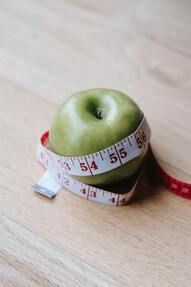|

Since launching our weight loss program earlier this year, I've had countless conversations with people who want to lose weight and it just won't seem to budge regardless of "doing everything right." They have tried exercise, supplements, medications, and every diet they can find--which by the way, I don't like the term 'diet' because it implies that someday the changes in food will be abandoned--and talked to their friends and tried what they were doing, and still NOTHING.
Everyone is different and I notice the difference especially between men and women. I always encourage lifestyle changes to occur as a household expedition, but male and female bodies may respond differently and require different nutrients (especially women depending on whether they're still menstruating or not). I've heard a lot of frustration from women that tell me their husbands lost 20 lbs. after starting intermittent fasting, and they lost 2 lbs. There is nothing more that I like to talk about when it comes to nutrition and fasting, but that's not what I want to focus on here because most people know the basics about which foods are nourishing and which are harmful. Afterall, every bite of food we put in our mouths is a signal to our bodies about what we want it to do --a cup of broccoli vs. a donut sends the message that we either love it or we don't care about it much. If you want to deep dive into food, either pick through my other blog pieces OR come in to talk with us at Balance Health! 1. SLEEP: Make it a priorityI can't tell you the number of times I have heard, "I will sleep when I'm dead." Well, with that attitude, you'll probably getting your endless sleep prematurely when compared to a person that makes sleep a priority. Another thing I hear often is someone bragging about how little sleep they can get by on. Well, the scale may be telling a different story, or it soon will! The benefits of sleep are countless, but what I want to focus on is how it effects our weight management.
If your body does not get the number of quality hours of sleep a night that it requires (generally 7-9 hours), then there are a number of hormonal imbalances that can arise. One negative effect is two hormones, ghrelin (hunger) and leptin (full), are no longer in harmony and you end up eating more just to stay awake. Furthermore, you are more likely to reach for a candy bar or chips than a salad and STILL not feel satiated. Additionally, if you eat dinner or snack later in the evening, you compound the issues with hormones. Digestion slows down at night and if you have food hanging out in the intestines longer than it should, that increases absorption time of calories. Insulin resistance is also more likely to develop when meals are consistently eaten after dark. The same meal eaten at 5 pm vs. 9 pm can have drastic different effects in the body. So yes, I'm applauding the folks that eat early dinners and don't snack afterwards! In the future I'll write a separate post about sleep, but in general, start with good sleep hygiene routine: eat your last meal early in the evening, ban technology within two hours of bedtime, keep phones out of the bedroom, take a warm shower, keep pets out of the bedroom, sleep in a cool and dark room, use a sound machine or fan if noise in or around your home is an issue, etc. If you are really curious about the quality of your sleep, look into the Oura Ring. Smart Ring for Fitness, Stress, Sleep & Health and combine it with a continuous blood glucose monitor (Levels - Unlock Your Metabolic Health (levelshealth.com) to get real time information on what is happening with your sugar levels day and night.2. STRESS: You must decompressI admit I sometimes feel like a hypocrite in this area because like any modern-day person, it feels like high stress levels are impossible to avoid. However, it's helped me to understand how stress hormonally impacts the body and why it can make it so dang hard for some people to lose weight. I will do my best not to get too sidetracked because there are many important hormones produced by the body in response to stress than can impact weight loss--or lack thereof.
In the event or real or perceived stress, the adrenals glands are activated by the sympathetic nervous system. The adrenal glands secrete adrenaline (epinephrine) and cortisol. Adrenaline is recognized by a faster heart rate, breathing faster and shallower, sweating, more alert, and feeling on edge. Cortisol is also part of the stress response which tells the liver to increase blood glucose so the muscles can be prepared for the battle. If glucose levels increase, so does insulin—insulin is the key to getting the glucose inside the muscle cells. After the stressful situation has passed, cortisol and insulin levels (in additional other biological processes) go back to baseline. Are you laughing at that last line like I am? Does the stress EVER end these days?
If you're a savvy reader, then you will then understand that when stress is perceived as chronic, then insulin levels stay high. When insulin levels are high, we end up storing more energy in the form of fat. In essence, the chronic stress is PREVENTING weight loss because from an evolutionary standpoint, the body thinks we are in a famine.
It is imperative to find a way to decrease your stress load. That will look different for everyone. Physiologically, you are trying to counter the "fight or flight" response with engaging the parasympathetic nervous system, or the "rest and digest" response. You may get adequate sleep, practice 4-7-8 breathing exercises, do yoga, take a walk and scan the horizon, scream into a pillow, laugh, inhale relaxing pure essential oils, pet your dog or cat, get outside, etc. Look into the Podcast or book called, Miracle Morning, for more self-care ideas. What are your stressors? Can you make changes in your schedule to reduce stress? If you're a woman, avoid overscheduling during the luteal phase, or approximately the last 10 days of your cycle. Avoid putting your kids in every single activity offered--it's not only demanding of your time and energy, but it can also actually be detrimental to their development as free play and being BORED is important for the development of the imagination! Say no to before or after work get togethers if they do not bring your joy.
Other ideas: perhaps you don't get on social media or watch the evening news if it distresses you. Maybe it's leaving a relationship or friendship that no longer feeds your soul (I say this with caution as I'm not trying to instigate divorces! Talk to him/her first and consider counseling). You can put limits on your work hours and resist the urge to work at home (here I am, the hypocrite on a Sunday afternoon!). You could change your living situation. Hire someone to clean your home. Get your groceries delivered or do curbside pickup. You get my drift.
TO ALL THE WOMEN OVER 35: Keep in mind that perimenopause marks the shift of hormone production winding down in the ovaries and the adrenals are taking over making our sex hormones (marking menopause). If you are rushing around like you are constantly running from a tiger, then your adrenals are not only pumping out adrenaline and cortisol, but they are also then bombarded with the job to produce sex hormones. This makes weight loss for a peri-and-menopausal woman even more challenging but makes it all that more important for priorities to be set, adjust schedules to this time of life, and let go of unnecessary demands. Your body will thank you. 3. MUSCLE: Build itThe majority of us have jobs that have us sitting the majority of the day. This does NOT do anything for our postures, let alone our muscle tone. Put simply, the more muscle you have, the more storage facilities your body has to store glucose! And if glucose is not in the blood stream, then insulin levels fall.
Peri-and-postmenopausal women may notice muscle mass loss because the ovaries are retiring. If the adrenals are overworked from chronic stress and need to take over sex hormone production (including testosterone), then the body will break down muscle to provide nutrients to the adrenals to attempt at keeping up production. We need muscle to store glucose and burn fat! When you do embark on a weight loss plan it's important to monitor body composition. Just because the reading on the scale is going down, it doesn't mean it's just fat that's being lost. At Balance Health we use the InBody to monitor these metrics in our patients. And a word of caution to those that have started semaglutide (Ozempic, Wegovy) peptide therapy: you absolutely need to make resistance training an important part of your long-term weight loss plan. Semaglutide can cause a breakdown in muscle mass which can set you up for even more weight gain in the future once you stop the medication. Good muscle mass is also an important factor in aging well so don't put off those weight or resistance training exercises any longer! Find a friend and keep each other accountable for doing workouts. Join the Balance Health gym (you don't have to be a patient!) and receive expert guidance from our trainers, Kyle and Keith, and you will join a community of motivated individuals like yourself. What are you waiting for? GET MOVING! 4. TOXINS: Get rid of themYour cells are constantly in communication with each other and the brain through hormones or neurotransmitters. When toxins are introduced to the body (eat, drink, breathe, or put on the skin), the toxins can start blocking cell receptor sites in the organs. Toxins can make us insulin resistant because they bind to receptor sites where insulin should be, and the pancreas keeps cranking out insulin because it receives messages that there is too much glucose in the blood, creating a traffic jam. Now that insulin can't get glucose into the cells, the glucose gets turned into fat.
Toxins that can contribute to weight gain are referred to as obesogens. One major contributor is BPA which is found in plastic. The Agouti Mouse Study involved two mice with the same obesity gene. They were fed the same number of calories and performed the same exercises, except one mouse was exposed to BPA plastic and the other was note. The mouse that was exposed to BPA plastic gained weight and its hair turned yellow! What's even more interesting is when the BPA plastic was taken away, the yellow, obese mouse lost the weight! They didn't even "detox" the mouse with a fancy protocol. So it's a big ask, but start clearing out the plastic baggies, Tupperware, Ziplock containers, plastic wrap, plastic water bottles, etc. Get rid of it all and replace it with glass, silicone, and stainless steel.
One other obesogen to be aware of is glyphosate which is a pesticide that makes it onto most of the food we eat. Buy organic whenever possible and if money is an issue, focus on the Clean 15 and Dirty Dozen when shopping the supermarket (EWG's 2023 Shopper's Guide to Pesticides in Produce | Clean Fifteen).
Others to get rid of: Styrofoam, scented candles, colognes and perfumes, antiperspirants, certain brands of cosmetics and skin care products, non-stick pans, scented detergents and dryer sheets, etc. The Environmental Working Group (ewg.org) is full of information on this topic! I hope this piece gave you some insight on what may be inhibiting your progress towards your weight loss goals. If you have questions, come see what we're all about at Balance Health! |




